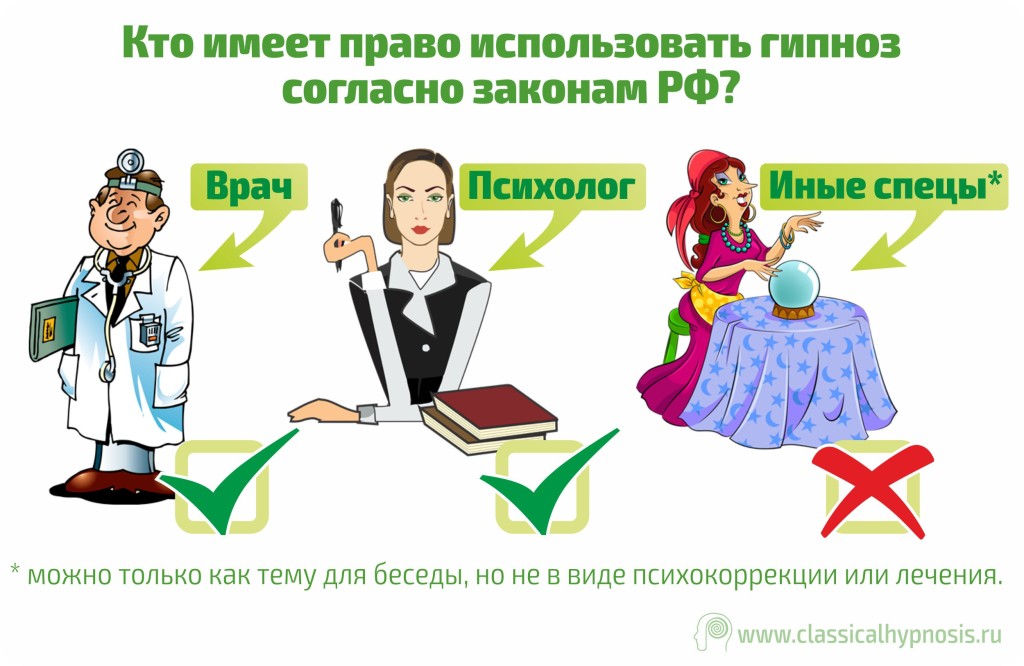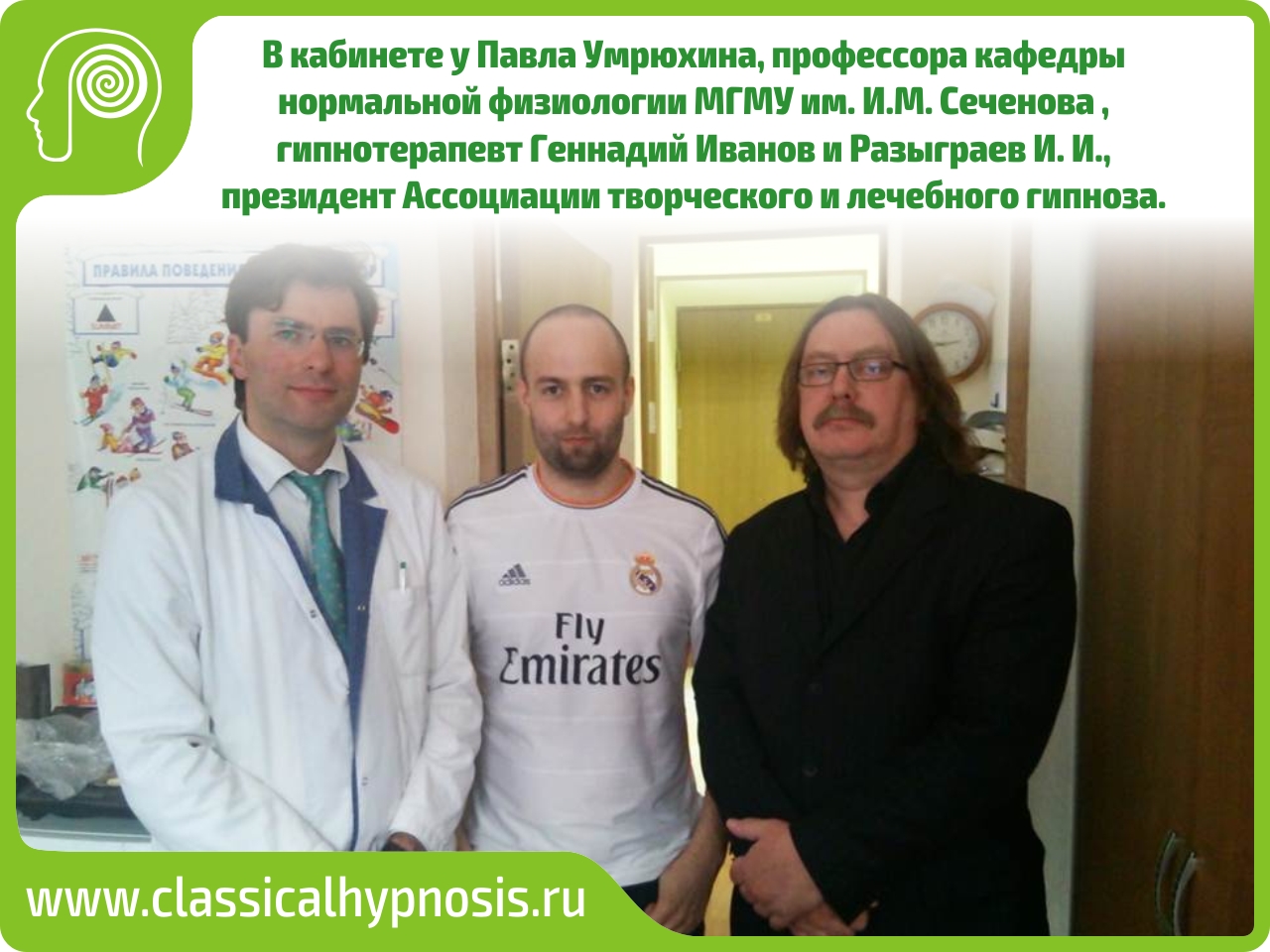Hypnosis and the laws of the Russian Federation
Hypnosis under the law & Law under hypnosis?
Is hypnosis treatment legal? Who is eligible to practice hypnotherapy?
The development of the Internet has given scope for advertising the services of doctors and psychologists of various schools, as well as for representatives of soul healers. Moreover, both categories of specialists use techniques and immersion in trance. What does the law say about this? What legal field exists for hypnosis and what is the punishment for deviation from the letter of the law? Let's try to figure it out.
To begin with, let's dwell on what hypnosis is in general. And here, unfortunately, we have to state that there is no officially recognized definition of the concept of hypnosis in Russian legislation today. Thus, it is not possible to legally establish the use of hypnosis in practice, since the law does not contain either the concept or signs of hypnosis. This means that it is very difficult to make a legal assessment of whether a hypnosis session was performed or not.
It is worthwhile to distinguish between hypnosis and trance, concepts that many mistakenly understand as synonyms. Hypnosis is a tool that is legally or illegally used by doctors, psychologists or other "specialists" in order to change the underlying beliefs of patients, clients. But trance (from the French transe - numbness) is a mental disorder akin to a “state of passion” in criminal law. "To fall into a trance" means to "lose your head." In medicine, trance is characterized by increased nervous excitement with loss of self-control, which, as a rule, is accompanied by clouding of consciousness. For this reason, in psychiatry there is a specific name for this disease: “trance and states of possession”, code F 44.3 according to ICD-10.
As a legacy from the USSR, there are norms that determine the circle of people who can conduct hypnosis. So, the Circular of the People's Commissariat of Justice of the RSFSR N 215, the People's Commissariat of Health of the RSFSR N 23 dated 10/27/1925 "Instructions for the use of hypnosis", establishes that hypnosis can be used only for therapeutic purposes and only for doctors. So far, no one has canceled this decree! That paper reads literally as follows: "The use of hypnosis is permitted only by doctors and in the relevant state medical and scientific institutions ..., on the basis of a special instruction issued by the People's Commissariat of Health in agreement with the People's Commissariat of Justice."
Thus, according to the letter of this document, hypnosis in Russia can be performed by persons working as a doctor, having a medical education and solely for the purpose of treating a patient. However, by establishing requirements for the qualifications of various specialists, as well as for them to obtain certain additional qualifications, the legislator creates a certain conflict in the question of who can perform hypnosis in Russia, which is aggravated by the fact that the definitions of hypnosis as such in the law are still no time.
In the official documents of the Ministry of Health and Social Development of the Russian Federation, which define medical specialties and qualification requirements for them, there are no separate specialties such as hypnologist, hypnotherapist, hypnotist. According to the order of the Ministry of Health and Social Development of the Russian Federation dated July 7, 2009 "On approval of qualification requirements for specialists with higher and postgraduate medical and pharmaceutical education in the field of healthcare", there are doctors who can choose areas of work (hypnosis, psychoanalysis, hypnotherapy, gestalt psychology, body targeted therapy).
It should be noted that the “hypnotherapist” is absent in the legislation precisely as a profession. At the same time, the law allows for the possibility of obtaining additional qualifications. So, according to the Federal Law "On Education in the Russian Federation" and the Order of the Ministry of Education and Science of the Russian Federation (Ministry of Education and Science of Russia) dated July 1, 2013 "On Approval of the Procedure for Organization and Implementation of Educational Activities in Additional Professional Programs", persons who have successfully completed retraining are given the right to engage in activities specified in the certificate of professional development,
There is a precedent, for example, the course "Hypnotherapy of psychosomatic disorders", which is approved by the educational program of the NOU DPO "Kirov Institute of Practical Psychology" (License No. 0243. 43 000430 dated July 17, 2015 of the Ministry of Education of the Kirov Region).
Conclusion: according to the current legislation of the Russian Federation, doctors and psychologists do not need any new permits for the use of hypnosis. Psychological correction may include hypnotherapy as one of the methods of work, along with other areas of psychology. Unlike psychologists, in the arsenal of doctors there are significantly more ways to influence the patient, in addition to hypnosis and suggestion, doctors have at their disposal the achievements of pharmacology and psychotherapy. Other professionals who have completed a course of hypnotherapy can use the acquired knowledge exclusively for conversations (without the provision of psychological and medical services) and educational lectures (without immersion in hypnosis and treatment with hypnosis).

What can be the responsibility of persons using hypnosis without proper documents (at least psychological education). If we talk simply about illegal healing carried out by all kinds of "magicians" and psychics, then here we can talk about bringing to administrative responsibility under Article 6.2. Code of Administrative Offenses of the Russian Federation "Illegal occupation of traditional medicine", which provides for a fine of 2,000 to 4,000 rubles. If the “hypnotist” carries out activities with a doctor’s diploma, which is only issued for a state diploma, then in this case we can talk about fraud (Article 159 of the Criminal Code of the Russian Federation. The maximum punishment is assumed in the form of imprisonment for up to two years, and in in the event of the commission of this crime by a group of persons by prior agreement or with the infliction of significant damage to a citizen, imprisonment up to five years). In the event that the actions of the healer performing hypnosis led to the infliction of grievous bodily harm, then in this case his actions fall under Article 118 of the Criminal Code of the Russian Federation (Causing grievous bodily harm through negligence Punishment in the form of imprisonment for committing this crime is not provided. Possible arrest up to six months, restriction of freedom up to three years, correctional labor for up to two years or a fine up to eighty thousand rubles).
In practice, there are few cases of prosecution for "criminal" hypnosis, carried out without any legal grounds. So, on December 19, 2006, Anatoly Kashpirovsky, well known to the older generation, was attracted by the decision of the justice of the peace of the Central District of Chelyabinsk under Art. 6.2. of the Code of Administrative Offenses of the Russian Federation to administrative responsibility for practicing traditional medicine in violation of the procedure established by law. Thus, the prosecutor's office revealed cases of Kashpirovsky's use of hypnosis without taking into account the individual characteristics of its impact on a person, which posed a danger to people's health.
One of the few countries where there is a clear regulation of hypnosis at the legislative level is Israel. This country, which pays close attention to medical issues, has a special law on the regulation of hypnosis, which establishes extremely stringent requirements for professionals who wish to use hypnosis in their practice. So, the mandatory requirements include: having a medical degree, no criminal record, as well as the need to pass a mandatory exam on the subject of hypnosis, which includes both a theoretical part and solving practical problems related to the possibilities of using hypnosis.
The website of the Israeli Ministry of Health says literally the following: “Hypnosis is a unique state of consciousness that allows, on the one hand, to deeply concentrate attention, and on the other hand, to filter out irrelevant external stimuli. A patient in a state of hypnosis does not sleep, his readiness to perceive suggestion increases, while maintaining the ability to critically assess reality. Despite widespread myths, a person does not lose control during hypnosis and does not become material in the hands of the creator, but on the contrary, hypnosis is a process in which both the patient and the doctor take part. Hypnosis is a treatment tool, not a method of treatment. Hypnosis can be used as part of medical and psychological treatment, as well as in dentistry.”

The Israeli legislator is truly meticulous about applicants for the right to be a "hypnotist" or "hypnotherapist" (both words are just a self-determination for a specialist what to call himself, having a diploma in psychology or a doctor, you can be both a psychoanalyst and a bioenergy therapist). These individuals, among other things, may only be admitted to the examination after having completed an officially recognized hypnosis preparatory course. At the same time, persons who have not passed the exam are entitled to only one “retake” within a period of not more than five years from the date of passing the first exam. Tough but fair, right? After all, behind these requirements is concern for citizens, their health and safety.
Perhaps, our legislators, who have been actively “reforming” the medical “industry” lately, should also look at the experience of the Israelis if they want to separate medicine from charlatanism and really care about the health of the nation. It is necessary, firstly, to legislate clearly define the concept and features of hypnosis. Secondly, to avoid conflicts. Repeal all by-laws previously affecting hypnosis and hypnotherapy and adopt a special law on hypnotherapy, which would clearly spell out who, when, where and under what conditions could practice hypnosis. Thirdly, the introduction of criminal liability should be envisaged for violation of the legal procedure for conducting hypnotherapy.
© The answer was prepared by Chermen Dzotov, lawyer, general director of the "Find a Lawyer" service for the selection of lawyers.




